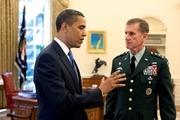 We are into least-worst options territory in Afghanistan as the New York Times Magazine’s brilliant profile of General McChrystal, the US and Nato Commander there, makes clear. As McChrystal says, “if we fail here, Pakistan will not be able to solve their problems — it would be like burning leaves on a windy day next door.” But how do you succeed in a country where the government is increasingly illegitimate, only one in four adults are literate and whose terrain and size offers succour to any insurgency?
We are into least-worst options territory in Afghanistan as the New York Times Magazine’s brilliant profile of General McChrystal, the US and Nato Commander there, makes clear. As McChrystal says, “if we fail here, Pakistan will not be able to solve their problems — it would be like burning leaves on a windy day next door.” But how do you succeed in a country where the government is increasingly illegitimate, only one in four adults are literate and whose terrain and size offers succour to any insurgency?
The legitimacy question is a very hard one to answer. When pressed on this, McChrystal tells the Times that the US and Nato will “have to avoid looking like we are part of the illegitimacy”. But that is far easier said than done. The literacy question is relevant because it makes it so much harder to work with Afghan forces. To quote the American in charge of training them, “When I was down in Helmand, where the Brits were training police officers, they said not only could none of them read but they didn’t understand what a classroom was. How can you train officers if they can’t write arrest reports?” While the only way to try and mitigate the size and terrain problem is to have a lot more boots on the ground and to concentrate on the protecting the most populated areas.
There is no doubt that McChrystal has thought deeply and creatively about the problem. If we accept that pulling out is not an acceptable option because it would destabilise Pakistan, offer al Qaeda a sanctuary and be a huge boost to the jihadi movement everywhere, then we have to do things as McChrystal suggests which involves placing a premium on protecting the population. This is going to require a more select use of airpower and more troops. It will need as much of the insurgency as possible to be peeled off. But McChrystal is right that you are not going to see a large number of Taliban changing sides or putting down their arms until they decide that they are not going to be successful and they won’t make that call until they see that the US is committed to the fight.
But Obama is still stalling on whether to give McChrystal the resources he has asked to. Instead, the president seems to be reviewing the strategy that he set out in the Spring and second-guessing the Commander he appointed.







Comments